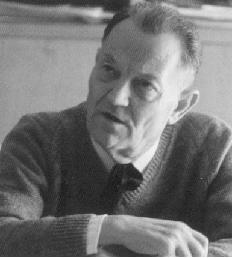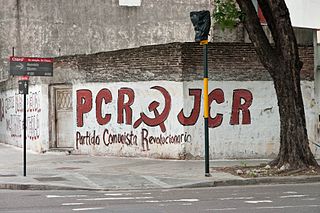
The Workers' Party of Marxist Unification was a Spanish communist political party formed during the Second Republic and mainly active around the Spanish Civil War. It was formed by the fusion of the Trotskyist Communist Left of Spain and the Workers and Peasants' Bloc against the will of Leon Trotsky, with whom the former broke. The writer George Orwell served with the party's militia and witnessed the Stalinist repression of the movement, which would help form his anti-authoritarian ideas in later life.

Grandizo Munis was a Spanish politician.
Iberian Communist Youth was the youth wing of the Iberian Communist Federation, and later of the Workers' Party of Marxist Unification (POUM). JCI had its main strength in Catalonia and the Llevant. The 1934 conference of JCI elected Germinal Vidal as the general secretary of JCI. After his death, Wilebaldo Solano from Valencia was elected in his place.
Wilebaldo Solano Alonso was a Spanish Communist activist during the Spanish Civil War, especially noted for his work with Socialist youth organizations as a member of the Workers' Party of Marxist Unification (POUM). Most of his activities before and during the Second Spanish Republic were centered in Catalonia.

The Communist Youth Union of Spain is the youth organisation of the Communist Party of Spain (PCE).

Jordi Arquer was a Spanish communist politician and writer from Catalonia.

The Revolutionary Communist Party is a Maoist communist party from Argentina.
Juan Andrade Rodriguez was a Spanish communist, journalist, politician and editor.

The Young Communist League is the youth organization of the Communist Party of Cuba. Its membership is voluntary and selective, and counts more than 600,000 active members. Its symbol shows the stylized faces of Julio Antonio Mella, Camilo Cienfuegos and Che Guevara. The motto is Estudio, Trabajo, Fusil and means "Study, Work, Rifle".

The World Federation of Democratic Youth (WFDY) is an international youth organization, and has historically characterized itself as anti-imperialist and left-wing. WFDY was founded in London in 1945 as a broad international youth movement, organized in the context of the end of World War II with the aim of uniting youth from the Allies behind an anti-fascist platform that was broadly pro-peace, anti-nuclear war, expressing friendship between youth of the capitalist and socialist nations. The WFDY Headquarters are in Budapest, Hungary. The main event of WFDY is the World Festival of Youth and Students. The last festival was held in Sochi, Russia, in October 2017. It was one of the first organizations granted general consultative status with the United Nations Economic and Social Council.

Acció ('Action') was a weekly newspaper published from Tarragona, Spain 1936–1937. It was the local organ of the Iberian Communist Youth (JCI), the youth wing of POUM. The first issue was published on 1 October 1936. Ricard Garriga Salvadó was the director of Acció. When Garriga was sent to the front, Josep Vilar took over as director of the newspaper. The offices of the newspaper were located inside the POUM-JCI office in downtown Tarragona, at Rambla 14 Abril on the corner with Carrer de Girona. The newspaper was printed at Suc de Torres & Virgili.

Joan Comorera i Soler was a left-wing Spanish politician from Catalonia who spent several years in Argentina before returning to Spain in 1931 at the start of the Second Spanish Republic. He was a Catalan nationalist, and was elected chairman of the Socialist Union of Catalonia in 1933. In 1936 he became Secretary General of the Unified Socialist Party of Catalonia (PSUC), in alliance with the Spanish Communist Party. During the Spanish Civil War (1936–39) he built up his party into a major political force during the struggles among the supporters of the Republic between Socialists, Stalinists, Trotskyists and Anarcho-syndicalists. After the Republicans were defeated by the right-wing forces led by Francisco Franco he went into exile, living in Mexico and then in France. In 1949 he was expelled from the Communist party for his Catalan nationalism, and survived an assassination attempt. In 1951 he moved back to Catalonia using a false name. He was arrested in 1954 and died in prison four years later.

Jesús Hernández Tomás was a Spanish communist leader. During the Spanish Civil War (1936–39) he was Minister of Education and Fine Arts, then Minister of Education and Health. After the war he went into exile in Oran, Moscow and then Mexico. He was expelled from the party in 1944 for disloyalty to the leadership, and purged from the official history of the party after writing a book in 1953 critical of the Stalinist role in the Civil War.
The Madrid Defense Council was an ad-hoc governing body that ran Madrid, Spain, for about six months during the Spanish Civil War (1936–39). It was formed in November 1936 after the Spanish Republican government had fled to Valencia when General Francisco Franco's forces advanced on Madrid. It was expected that the city would fall within a few days, but the arrival of the International Brigades halted the rebel advance, and the situation settled into a stalemate. The council was dominated by communists, who had superior organization and propaganda to the other groups. Their policy was to organize the militias into regular troops and focus on defeating the enemy, rather than to undertake revolutionary activity. As time passed there was growing tension between the communists and more radical groups. The council was dissolved in April 1937 and replaced by a new city council.

Federico Melchor Fernández was a Spanish journalist and communist politician. He was one of the leaders of the Communist Youth Union of Spain. During the Spanish Civil War (1936–39) he was general director of Propaganda in the government of Juan Negrín. He became a member of the Central Committee of the Communist Party of Spain.

Vicente Uribe Galdeano was a metalworker who became a member of the executive of the Communist Party of Spain. He served as Minister of Agriculture during the Spanish Civil War (1936–39). He went into exile in Mexico during World War II (1939–45), then lived in France and Czechoslovakia after the war. He was disgraced in 1956 during the post-Stalinist power struggle.

José Cazorla Maure was a Spanish communist leader during the Spanish Civil War (1936–39). He was one of the leaders of the Unified Socialist Youth. For several months in 1936–37 he was a member of the Madrid Defense Council in charge of public order. He was ruthless in weeding out sabotage or subversion, and earned the hostility of the anarchists and Trotskyites. Later he was made governor of the province of Albacete and then of Guadalajara. He remained in Spain after the war, and was arrested and executed by firing squad.
Women in the Workers' Party of Marxist Unification, Partido Obrero de Unificación Marxista (POUM), in the Spanish Civil War were faced with many of the same problems as other Communist and Anarchist women in the 1930s, such as hypocrisy of the male leadership in their support of women's rights, while continuing their sexist and patriarchal behavior in private.
Women in the Communist Party of Spain (PCE) in the Spanish Civil War were highly active, the most visible figure in the movement being Dolores Ibárruri, who joined in its early years. The Dictatorship of Primo de Rivera pushed the group underground, where they had to meet clandestinely around their public face, the football club Oriente FC.
Women in POUM in Francoist Spain were few as many, along with male dominated leadership, were forced into exile following the end of the Spanish Civil War. Those in exile often felt isolated and alone. Those who remained were sometimes sent to prison. POUM women participated in a hunger strike at Madrid's Las Ventas prison in 1946. The group fell by the wayside as Partido Comunista de España became the pre-dominant resistance organization in Spain. The organization finally dissolved during the 1950s in Toulouse, France with its memory kept alive by the wife of its last president, María Teresa Carbone, through the Fundació Andreu Nin.













